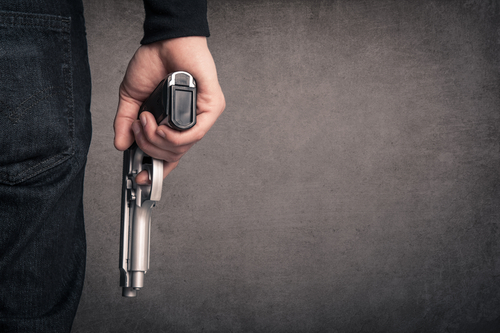This post first ran on May 21, 2013. I wish it would stop being relevant to the news. 
I recently witnessed one of the kindest, gentlest people I know fly into a momentary rage over a parking space. Such transformations used to baffle me, but after writing a Discover story about embodied cognition, I’m starting to understand why normally mild-mannered people can become uncharacteristically aggressive behind the wheel of a large automobile.
The big idea behind embodied cognition is that thoughts and perceptions are not confined to the brain, but extend to the body too. As a result, our bodily states affect how we think and our perceptions are fundamentally shaped by our ability to act.
Get behind the wheel and suddenly the world looks different. You’re protected by a big chunk of metal, and you’re navigating the world with the power of an internal combustion engine. You not only see the world differently, you may behave differently too, as my friend’s moment of road rage demonstrated.
“We think of perception as providing us with this geometrically accurate picture of the world,” says Jessica Witt, a psychologist at Colorado State University. But while we may believe that we see the world as it really is, Witt’s research suggests that our perceptions are guided by what we’re doing with our bodies.
In a study published in the Journal of Experimental Psychology: Human Perception and Performance last year, Witt and her colleague James R. Brockmole at the University of Notre Dame performed a series of five experiments that asked college students to look at photos of people holding something and then indicate whether the object was a gun or something neutral like a ball or a shoe. When the participants held a plastic gun, they were about 30 percent more likely to deem the object a gun.
“It’s like that old saying — When you hold a hammer, everything looks like a nail,” Witt says. Simply having a gun in the room had no effect — something about holding the gun seemed to prime the brain to see a gun in the other person’s hand.
This is just one set of experiments, of course, and Witt is now working to recruit police officers for a follow up study to determine whether the effect also holds for people trained to make such determinations. But the study suggests that simply packing heat primes people to perceive objects around them as threatening.
As Witt and Brockmole write in their paper,
The act of wielding a firearm raises the likelihood that nonthreatening objects will be perceived as threats. This bias can clearly be horrific for victims of accidental shootings. According to the American Civil Liberties Union, approximately 25% of all law enforcement shootings involve unarmed suspects and, although it is impossible to derive a precise number, it is certain that many similar accidental shootings occur among private citizens.
In real-life situations, the determination of whether an object in someone’s hands is a gun or something harmless, like a wallet, is often fraught with emotion, which may further intensify bias toward seeing a gun. A 2010 study found that anger primed people to misidentify neutral objects as guns, and Witt’s team found that fear could also increase the likelihood that someone perceived a gun. “When we used stimuli that were scarier, we saw an increased bias toward seeing guns,” she says.
“We see the world in terms of our ability to act,” Witt told me. The very same object can look vastly different depending on what you intend to do and your ability to perform that intended action.
As a gun user, I support the Second Amendment, but I’ve also developed a healthy respect for the way that holding a gun can transform the way I perceive my surroundings. When I’m holding my rifle, I feel powerful, but I also feel a heightened sense of danger. It’s a way of interacting with the world that I don’t want to carry with me in everyday life.
Image by Shutterstock.
And how many permitted concealed carry people have been convicted of a sudden rage shooting spree in the last five years? Ten years? Such folks are about the MOST law-abiding people in the country.